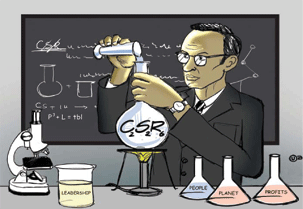At a recent fundraiser in the city, one of those somewhat surrealistic evenings replete with Caesarian trappings that the excitement seekers gather at, the scion of an industrial empire outbid other birds of the feather to become the proud owner of a dress that a certain lascivious actress had worn in a hit film of yesteryears. All for a good cause. After all it was a fundraiser. Of course those present who had not participated in the bidding owing to comparatively lesser resources pronounced the highest bidder to be a pervert and a bragger. No matter. The highest bidder is on a high with his new acquisition and the cause is delighted that the auction had gone well. Icing on the cake really, as the big bucks had already been made when the hundred odd tables seating ten persons each had been pre-sold several weeks before the event itself. At a hundred thousand rupees each, the tables had raised a cool crore long before the DJ had played the first trance track of the evening.
The party progresses and everyone has a good time. Its a win-win situation for all. A fun evening paid out of corporate coffers. The annual report will duly report x amount donated to a charity working for the lesser privileged under the company’s corporate social responsibility programme. CSR. Three letters mouthed as often as CIA. Not that a connection is implied!
Subject specialists would not classify the payment made for the female garment mentioned earlier as CSR. This action would be defined by them as corporate philanthropy at best. Cheque-writing to use another, less complimentary term that is also applied. Of course the recipients of the largesse are not bothered what appellation you give to it. But the donors insist it is CSR. After all a commercial company exists to make profits. So why should it give away money (read earnings) to some NGO? This is done, they justify, because the company is exercising corporate social responsibility. The company cannot itself set up and operate for example a children’s hospital, the argument further goes. It is not its business. So it does the next best thing instead and donates a sum of money to a suitable organisation that can be trusted to do just that set up and operate a children’s hospital. Thus the proponents of cheque-writing are very comfortable that they are in fact giving something back to society and are hence practicing CSR. If a strategic and much sought after table for ten at a highly desirable soiree comes their way in the bargain, then it is just coincidental.
Purists are not convinced. They think the driving force in such an instance is the urge to revel rather than an altruistic calling to serve humanity. For them true CSR has a much deeper and complex meaning.
Firstly, it should be an ongoing and a long-term commitment and not a one-off gesture that uses the instance as a photo opportunity. And secondly, they say, true CSR aims at bringing about real and sustainable change rather than providing only temporary relief or, so to speak, merely being a bandage instead of a cure.
The debate between the proponents of the two points of view can get quite extended.
What is important to understand though is that the two arguments are not contrary to each other. Instead, the belief of the purists must be seen as a higher level of understanding of what CSR ought to be as it evolves and matures within individual organisations. And there is a very simple and logical reason why a CSR programme must continue to evolve and gain depth. The ultimate objective of CSR is to benefit society. Cheque-writing certainly helps, but the benefits may come at a cost that is beyond the amount of the cheque itself. Costs in human terms that may not be overtly obvious in the beginning. Any number of negative forces may be at work. The credibility, honesty and competence of the cheque’s beneficiary for instance. Even given that the beneficiary is doing a good job, the question still remains whether the beneficiary was the right choice to start with.
This brings us to the concluding point. If a company’s CSR programme is conceptualized and planned to relate to its own core values and to its business, then as a result two things will happen. One, the selection of beneficiaries will have some logic behind it, leading to more efficient utilization of the funds committed. And two, the company will have a much greater degree of participation in the programme, extending beyond the financial into less tangible but equally important realms of human effort and cooperation. This, relating to the adage that companies exist to make profits, will in turn ultimately lead to greater return to the company in terms of a more empowered society, that will assure a market for future sales of products or services that the company offers. At the ethical-moral level the company becomes eligible to sign off its CSR obligation as Responsibly
Yours, XYZ Corporation.






